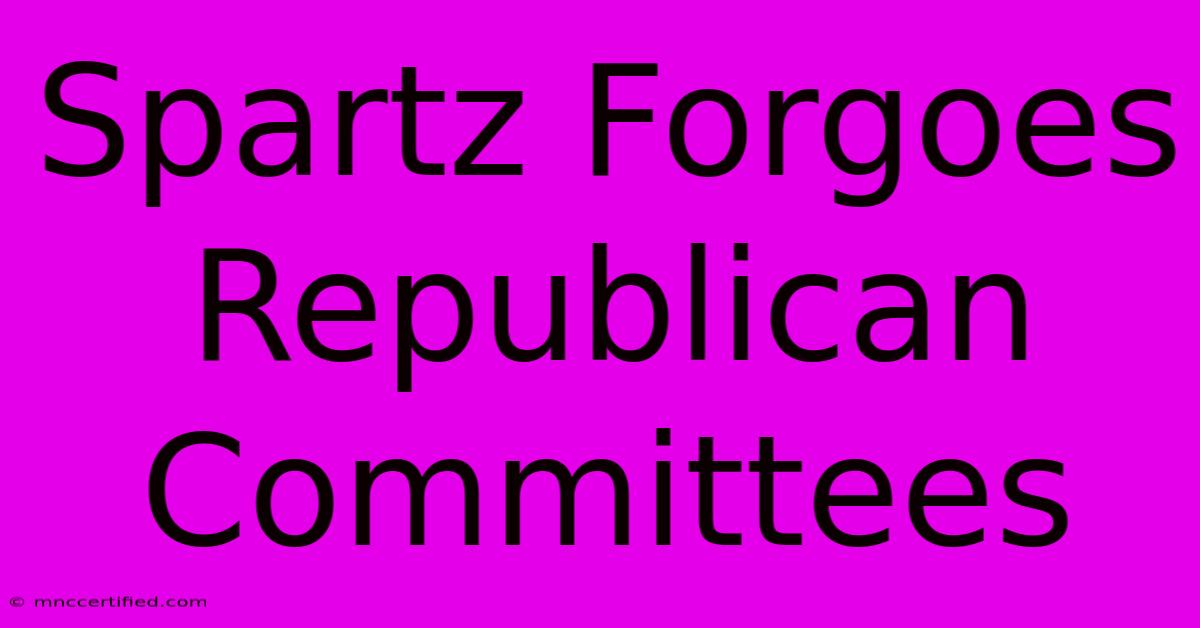Spartz Forgoes Republican Committees

Table of Contents
Spartz Forgoes Republican Committees: A Deep Dive into the Indiana Representative's Decision
Indiana Representative Victoria Spartz's decision to forgo leadership positions within the Republican Party has sent ripples through the political landscape. This unexpected move warrants a closer examination, delving into its potential motivations, consequences, and implications for both the Republican Party and Spartz herself.
Understanding Spartz's Rationale: Why the Break?
Spartz's announcement, while lacking explicit detail, hinted at deep-seated frustrations within the Republican Party structure. While she hasn't publicly articulated a comprehensive list of grievances, several factors likely contributed to her decision:
Internal Party Conflicts:
The Republican Party, like any large political organization, faces internal divisions. These disagreements, often playing out behind closed doors, can lead to significant tension and frustration for individual members. Spartz's decision could reflect her disillusionment with these ongoing internal power struggles and ideological clashes. Intra-party conflict is a significant factor often overlooked in political analyses.
Policy Disagreements:
While Spartz generally aligns with the Republican platform, specific policy disagreements might have fueled her decision. Perhaps she felt her voice wasn't being heard on crucial issues, or that the party wasn't adequately addressing her concerns. Identifying these potential policy disagreements requires further investigation and analysis of her past voting record and public statements.
Strategic Positioning:
Some political analysts suggest Spartz's move is a strategic maneuver. By distancing herself from the established Republican leadership, she might be positioning herself for a future leadership role or seeking to appeal to a broader electorate. This strategic positioning theory highlights the complex calculations involved in political decision-making.
Personal Reasons:
It's also important to acknowledge the possibility of personal factors influencing Spartz's decision. The demands of political life can be incredibly taxing, and personal considerations could have played a significant role in her choice. While we may not know the specifics, acknowledging personal reasons adds nuance to the situation.
The Impact of Spartz's Decision: Ripple Effects Across the Political Spectrum
Spartz's decision carries significant implications:
Weakening the Republican Party?
Her withdrawal could be interpreted as a sign of weakness within the Republican Party, highlighting internal divisions and potential cracks in its unity. The loss of a rising star like Spartz could impact the party's ability to attract and retain talent. This weakening of the party narrative is a key consideration for political observers.
Boosting Spartz's Profile?
Conversely, this bold move could elevate Spartz's profile. By forging her own path, she might appeal to voters disenchanted with traditional politics. This profile boost could position her for future opportunities within or outside the Republican Party.
Impact on Indiana Politics:
Within Indiana, Spartz's decision will likely have a ripple effect on local politics. Her stance could influence other Republican officials and potentially impact future elections within the state. This impact on Indiana politics deserves focused attention from local news outlets and political analysts.
Conclusion: A Waiting Game for Answers
Ultimately, the full implications of Spartz's decision will unfold over time. While her stated reasons are limited, the move signals a significant shift within Indiana and national Republican politics. Further investigation and analysis are needed to fully understand the underlying motivations and the long-term consequences of this strategic move. The unfolding narrative will be one to watch closely in the coming months and years.
Keywords: Victoria Spartz, Republican Party, Indiana politics, political strategy, intra-party conflict, policy disagreements, strategic positioning, political analysis, Republican leadership, election implications.

Thank you for visiting our website wich cover about Spartz Forgoes Republican Committees. We hope the information provided has been useful to you. Feel free to contact us if you have any questions or need further assistance. See you next time and dont miss to bookmark.
Featured Posts
-
Rayful Edmond Dc Cocaine Kingpin Dies At 60
Dec 18, 2024
-
Mishal Husains Final Today Show
Dec 18, 2024
-
Gop Committee Caucus Boycott Announced
Dec 18, 2024
-
Dj Jordan North River Thames Rescue
Dec 18, 2024
-
Persistent Problems Plague Unc Basketball
Dec 18, 2024